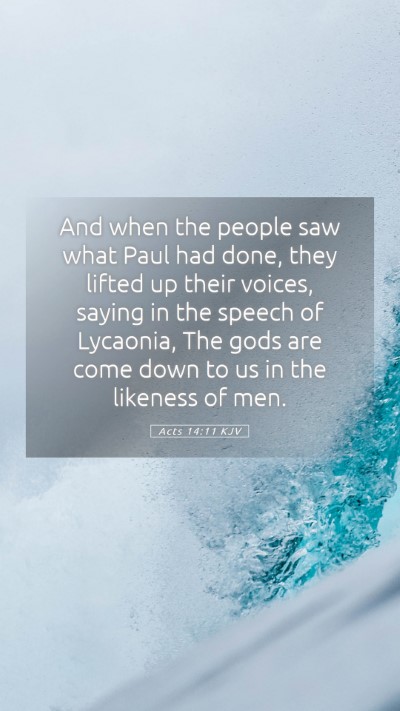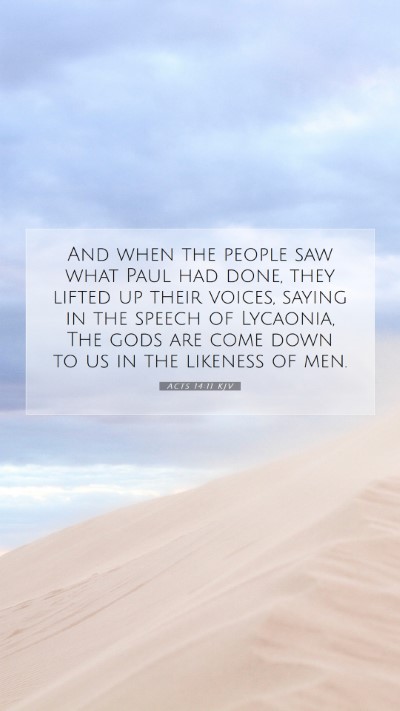Understanding Acts 14:11
Acts 14:11 states, "And when the people saw what Paul had done, they lifted up their voices, saying in the speech of Lycaonia, The gods are come down to us in the likeness of men." This verse captures a pivotal moment in the ministry of Paul and Barnabas during their missionary journeys.
Contextual Overview
In this passage, Paul and Barnabas had just performed a miraculous healing of a crippled man. The amazement of the people leads them to mistakenly attribute divine status to the apostles, reflecting typical ancient practices of deification.
Verse Meaning and Exegesis
This verse highlights the themes of misunderstanding and misinterpretation of divine actions.
- Miracles as Signs: As Albert Barnes emphasizes, miracles served as signs to validate the Apostles' message of the Gospel. This moment was not just about the act itself but was aimed at drawing attention to the truth of Jesus Christ.
- Human Response to the Divine: Matthew Henry elaborates on the human tendency to misinterpret divine interventions. The Lystrans mistake Paul and Barnabas for gods, showcasing a significant misunderstanding of God's nature and the role of His messengers.
- Misplaced Worship: Adam Clarke warns of the dangers of idolizing human figures. The crowd’s quickness to equate Paul and Barnabas with deities reveals a common flaw in humanity: giving glory reserved for God to mere mortals.
Theological Insights
From a theological perspective, Acts 14:11 raises critical questions about the nature of worship and recognition of divine authority in the Church’s early days.
- The Nature of God: This verse invites readers to consider the distinction between Creator and created, urging a rightful reverence towards God alone.
- Role of Apostles: The apostles were chosen vessels, and through their actions, God was revealing aspects of His character. Their abilities to perform miracles were secondary to the Gospel's core message.
- Human Fallibility: It portrays human fallibility—our tendency to elevate those who, like ourselves, are flawed while forgetting the ultimate source of power and goodness in God.
Cross References
- Acts 12:21-23: The story of Herod, who suffered divine judgment for taking glory unto himself.
- Romans 1:25: A reminder of the dangers of worshiping created things rather than the Creator.
- 1 Corinthians 3:5-9: Paul’s reminder of the nature of ministry and where the glory should be directed.
- Galatians 1:10: Paul’s emphasis on his role not as a pleaser of men but as a servant of Christ.
Application for Life
As believers reflect on Acts 14:11, they are challenged to examine their own lives for areas where they might misplace their devotion and admiration. Here are some practical takeaways:
- Focus on Jesus: Ensure that any admiration for church leaders or prominent figures is redirected towards Christ.
- Responding to Miracles: When witnessing God at work, allow those instances to deepen faith rather than leading to misplaced worship.
- Education and Understanding: Engage in Bible study groups to deepen understanding of how scriptural events relate to one's life and faith.
Conclusion
Acts 14:11 serves as a profound reminder of how divine works can easily be misunderstood. By exploring its meanings through Biblical exegesis and scholarly interpretations, believers can grow in their understanding of Scripture and learn to appropriately respond to God's actions in their lives.


